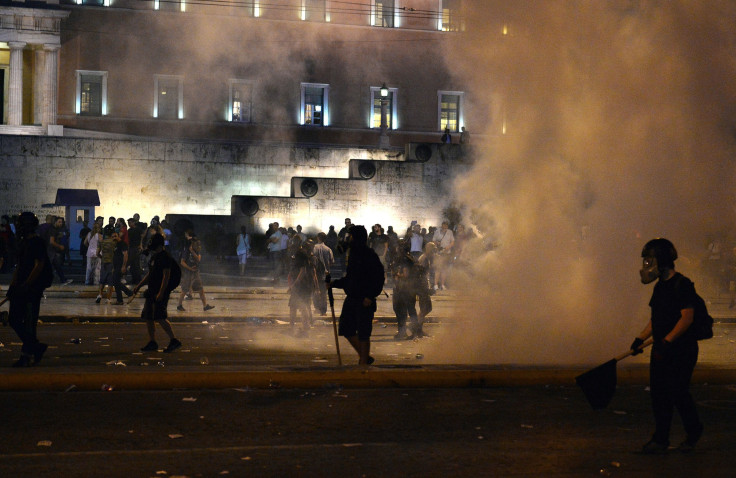Greece Bailout Vote: Ruling Syriza Party Riven By Divisions, Faces Challenges In Governing

Even as Greek lawmakers voted Wednesday to accept an international bailout that includes strict austerity measures, the left-wing government of Prime Minister Alexis Tsipras is facing an increasingly uncertain future, with upheaval in the ranks of his party and a banking system on the verge of collapse. Wednesday's vote saw almost 40 members of Tsipras' own party, including outspoken former Finance Minister Yanis Varoufakis and parliamentary speaker Zoe Konstantopoulou, vote against a deal that he himself admitted contained “harsh” austerity measures, and was unlikely to help the Greek economy move toward growth.
Tsipras had earlier said that his government could not function without the support of a minimum of 121 MPs, according to Financial Times correspondent Henry Foy. In Wednesday's vote, Tsipras managed only to secure the support of 124 government lawmakers, giving him a wafer-thin margin of support, which raises the prospect that he may be forced to call snap elections in the coming months to firm up his mandate, or seek to form a unity government.
Whether voters would renew the government's mandate is uncertain. Athens was rocked by protests that erupted into violence as the debate raged inside parliament Wednesday. The deal that Tsipras agreed to with Greece's European creditors also includes more austerity measures than one that Greek voters rejected in a referendum earlier this month.

The debate in Greece's parliament over the bailout revealed bitter divisions inside the legislature, with one right-wing lawmaker tearing up his papers as he spoke, and MPs jeering Tispras as he spoke in favor of the deal. In addition, former finance minister Varoufakis branded the deal “a new Treaty of Versailles,” a reference to the peace deal imposed on Germany after World War I.
In the near term, Tsipras is expected to reshuffle his cabinet, replacing any rebels who give up their parliamentary seats, and relying on the support of the opposition to proceed with his agenda. Government officials were briefing that Tsipras would not resign in the early hours of Thursday, according to the Guardian.
A Greek government spokesman also told the paper early Thursday that the priority is to complete the bailout, rather than worry about internal divisions.
Markets in Asia reacted positively to the news that Greece's parliament had approved the deal, with the main indicators all up in early trading, but there are still uncertain times ahead for Europe. Greek banks remain closed amid fears many are on the verge of running out of money, and capital controls remain in force.
On Wednesday, the European Commission proposed that 7 billion euros in emergency funds should be provided to Greece from the European Financial Stability Mechanism to shore up the country's banking system. Some countries, including the U.K., have opposed using the fund to provide short-term loans to Greece, the Irish Times reported. The U.K., which is in the European Union but is not in the eurozone, has been keen to insulate itself from any financial liability resulting from efforts to prop up the currency.
The parliaments of several other EU member states also must now ratify the deal before it is formally approved.
© Copyright IBTimes 2024. All rights reserved.






















